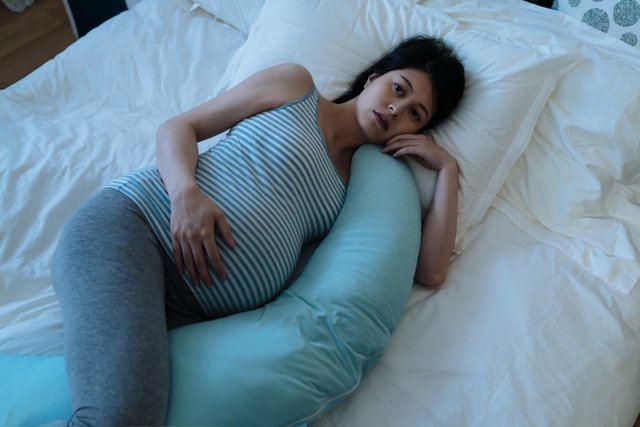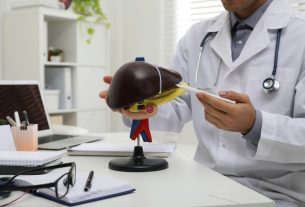Insomnia during pregnancy can be caused by hormonal changes, an uncomfortable position, due to the increased size of the belly, or a greater desire to pee, for example, and is a common situation.
Insomnia can happen at any time, being more common during the first and third trimesters of pregnancy. This is because during the second trimester of pregnancy, hormonal levels become more balanced and the belly is not yet big enough to make sleeping positions difficult.
To combat insomnia and sleep better, women can place a pillow between their legs to make themselves more comfortable, avoid stimulating drinks after 6 pm, sleep in a quiet environment with little light, avoid very noisy and bright environments at night, and do relaxing activities, such as Yoga. stretching or meditation, for example.

Main causes
The main factors that can promote insomnia during pregnancy are:
1. Hormonal changes typical of pregnancy
During pregnancy there are changes in hormone levels, mainly progesterone and estrogen as the pregnancy develops.
The increase in progesterone levels at the beginning of pregnancy can have a sedative effect on the nervous system, which can make the woman feel more sleepy during this period, however it is common for this sleep to not be invigorating and to be often interrupted, as this hormone can also act on the muscles of the urinary system, as well as being related to nausea, which can cause the woman to wake up several times during the night.
Furthermore, an increase in estrogen can also be associated with insomnia, because this hormone has a stimulating effect, which can make it more difficult to fall asleep, as well as causing women to wake up more often during the night and can’t sleep afterwards.
2. Increased urge to pee
The greater urge to pee is one of the main causes of insomnia during pregnancy and is due to the fact that the baby’s development increases the pressure on the bladder, so that just a small volume of urine is enough to increase the urge to go to the bathroom. bathroom.
Furthermore, the increased concentration of progesterone in the blood can also act on the muscles of the urinary system, resulting in more trips to the bathroom. Therefore, the greater urge to pee can make the woman get up more often during the night to go to the bathroom, resulting in insomnia.
3. Asia
Heartburn is also a situation that can be related to insomnia during pregnancy and can occur as a result of increased progesterone levels.
This hormone can act by reducing intestinal flow and relaxing the esophageal sphincter, which can cause gastric acid to return to the esophagus and throat, leading to the appearance of heartburn symptoms, which can be quite uncomfortable. Find out how to identify the symptoms of heartburn during pregnancy.
4. Anxiety or stress
Anxiety and stress are common situations during pregnancy and can also cause insomnia, because it is often difficult to relax and rest in these situations, and sleep can be unrefreshing and lead to the woman waking up several times during pregnancy. night or sleep a few hours.
5. Belly size
The size of the belly, especially at the end of pregnancy, can also cause insomnia, because it is more difficult to find a comfortable sleeping position that helps you relax.
6. Arm or leg asleep
It is common for arms or legs to fall asleep during pregnancy, which is often a consequence of the position in which the woman sleeps, which can compromise blood circulation in the area, causing it to become numb, which can be uncomfortable and cause the woman to not be able to sleep. be able to sleep.
Read too: Sleep during pregnancy: is it normal? when it appears (causes and what to do)
What to do to sleep better during pregnancy
Some tips to combat insomnia and sleep better during pregnancy are:
- Go to bed at the same time every day to create a sleep routine that makes it easier for the body to relax;
- Sleep on your side, preferably, placing a pillow between the legs and supporting the neck on another pillow, as insomnia during pregnancy is often caused by the pregnant woman trying to find a comfortable sleeping position;
- Drink calming teasuch as lemon balm or chamomile tea, for example, or passion fruit juice 30 minutes before going to sleep to relax the body and help promote sleep;
- Avoid very bright and noisy environmentssuch as shopping malls, music shows and shopping centers at night;
- Use a small lavender pillow which can be heated in the microwave and always sleep with it close to your face or place about 5 drops of lavender essential oil on your pillow, as lavender induces sleep, helping to reduce insomnia.
- Take a shower with warm water before going to sleep to relax the body;
- Practice Yoga, stretching or meditation to relax the body, as anxiety, which is generally present during pregnancy, is one of the causes of insomnia during pregnancy.
Furthermore, it is important that women have healthy eating habits and practice physical activity as recommended by their obstetrician, as this makes it possible to combat insomnia effectively. Insomnia during pregnancy can be treated with medication, however, its use should only be carried out under the guidance of the obstetrician monitoring the pregnancy.
See these and other tips for better sleep in the video below:
Does insomnia during pregnancy harm the baby?
Insomnia during pregnancy does not harm the baby’s development, however recent studies have shown that reduced sleep quality in pregnant women can increase the risk of premature birth. This would be due to the fact that due to insomnia there would be a greater release of hormones related to stress and inflammation, such as cortisol, for example.
Therefore, if a pregnant woman has insomnia, it is important to consult an obstetrician and, in some cases, a psychologist so that she can relax and get an ideal night’s sleep. Furthermore, it is recommended that women have an adequate diet and practice physical activity as advised by a physical education professional and obstetrician.

Sign up for our newsletter and stay up to date with exclusive news
that can transform your routine!
Warning: Undefined array key "title" in /home/storelat/public_html/wp-content/plugins/link-whisper-premium/templates/frontend/related-posts.php on line 12
Warning: Undefined array key "title_tag" in /home/storelat/public_html/wp-content/plugins/link-whisper-premium/templates/frontend/related-posts.php on line 13



